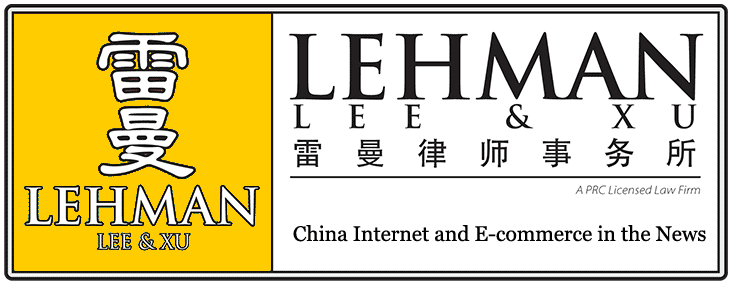
 |
|
LEHMAN, LEE & XU China Lawyers
|
|
China Internet and E-commerce In The News
|
|
December 2013
|
The China Law News keeps you on top of business, economic and political events in the China. |
|
|
|
In the News |
Qualcomm Says China Agency Started Anti-Monopoly Law Probe |
Nov. 25 (Bloomberg) -- Qualcomm Inc., the world’s largest maker of chips for smart phones, said China’s National began an investigation related to an anti-monopoly law. The NDRC has advised that specific details of the probe are confidential, Qualcomm said today in a statement. The San Diego- based company isn’t aware of any charge by the agency that it violated the anti-monopoly law. Qualcomm gets revenue from chip sales and collects license fees from wireless providers for the shipment of most Internet- capable phones. Its push to expand the reach of its technology and chips in China may be leading the government to examine its dominance, especially as the country tries to foster a local chip industry capable of competing with overseas companies, said Gus Richard, an analyst at Piper Jaffray & Co. “China wants to give as much advantage to their indigenous chipmakers as they can,” said Richard, who rates the shares the equivalent of a hold. “They care a lot about communications infrastructure and cell phones. I don’t think China’s going to pay them.” Emily Kilpatrick, a spokeswoman at Qualcomm, said the company won’t comment beyond the statement. The shares fell 1.5 percent to $71.86 at 12:50 p.m. in New York. The stock had gained 18 percent this year through Nov. 22. Antitrust Meeting Qualcomm got 49 percent of its $24.9 billion in sales from China in the fiscal year that ended in September, with some of that coming from phones that were assembled in China and sold in other countries. The company today said it will cooperate with the NDRC’s probe. Qualcomm was invited to a meeting about antitrust regulations in July by the country’s commerce ministry, a spokeswoman said at the time. The company gets the majority of its total revenue from chips that run smart phones, and the bulk of its profit from licensing technology that is central to modern cell-phone networks and handsets. That means even phone-service providers that don’t use Qualcomm chips pay it royalties for use of its patents. The company collected technology-license fees on more than a billion phones in fiscal 2013 and sold more than 700 million chips. China Mobile China Mobile Ltd., the world’s largest wireless carrier, hasn’t paid Qualcomm licensing fees after opting to use an alternative technology for its current data network that the Chinese government said wasn’t covered by the U.S. company’s patents. Qualcomm said it expected that to change next year, as China shifts to a new higher-speed technology for mobile networks called long-term evolution, or LTE. Last week at the company’s analyst day in New York, executives said the network shift means Qualcomm will be able to supply chips and get licensing revenue from China Mobile. The Chinese government has been stepping up scrutiny recently as new leadership expands an anti-corruption drive and cracks down on business practices that lead to increases in consumer prices. In August, the government fined six dairy companies including Danone for fixing the prices of infant formula products, and five Shanghai-based gold retailers and a local trade association for manipulating jewelry prices. The August fine over baby-formula price fixing, a combined 669 million yuan ($110 million) for dairy companies also including Mead Johnson Nutrition Co., was a record for violating anti-monopoly laws. Another high-profile probe into a foreign company this year centered around London-based GlaxoSmithKline Plc. Four senior executives from the company were detained in July on suspicion of economic crimes. |
|
|
|
|